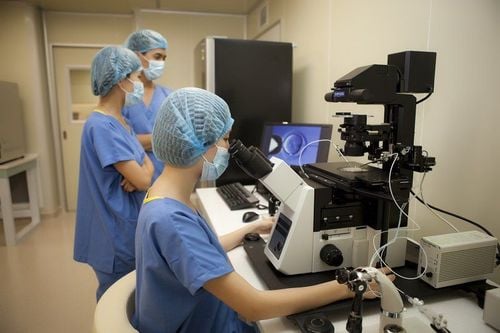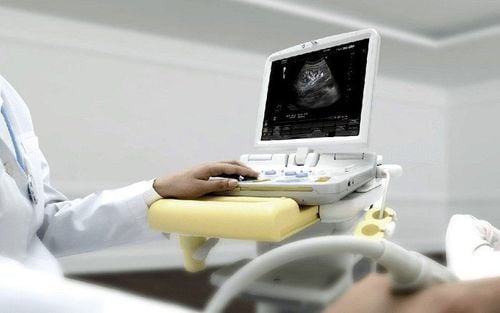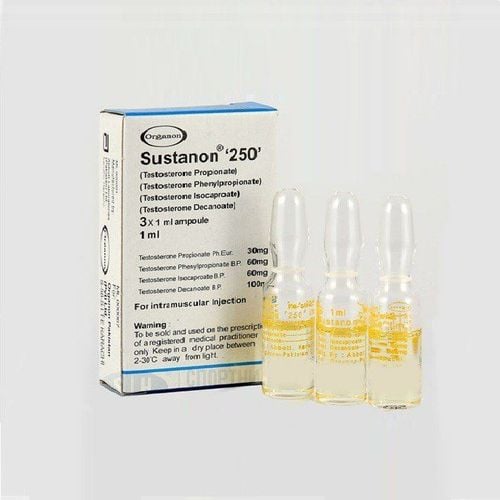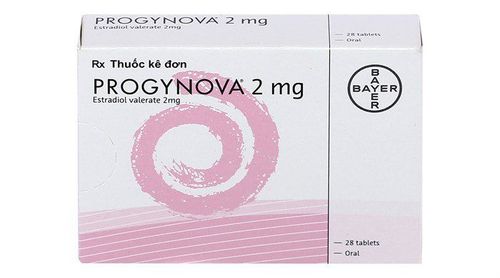This article was professionally reviewed by MSc. MD. Nguyen Ngoc Chien, Assisted reproductive technology (ART) Center - Vinmec Times City International Hospital.
The egg retrieval procedure is inherently a sophisticated technique. Every action requires precision and gentleness, as improper execution can pose significant risks. Understanding and preparing for potential complications after egg retrieval are essential to ensure a successful in vitro fertilization (IVF) process for women experiencing infertility.
1. What Is the Egg Retrieval Procedure?
After hormone treatment to stimulate the ovaries to produce multiple eggs at once, IVF specialists retrieve mature eggs from the ovaries.
The egg retrieval procedure typically takes place approximately 36 hours after administering the HCG injection to mature the eggs. In natural ovulation, a follicle ruptures, and the egg is released. The egg is then quickly captured by the fimbriae of the fallopian tube and transported through the tube toward the uterus. Therefore, timing the retrieval is critical to ensure the eggs are collected right before they begin this journey, at a point when they are ready for fertilization but still within the follicles and visible under ultrasound.
To retrieve eggs, the doctor inserts an ultrasound probe into the vagina, equipped with a needle guide to direct the needle through the vaginal wall and into the ovary. The procedure is guided entirely by ultrasound. Once the needle reaches the ovary, the doctor punctures each follicle in turn. When the needle is within a follicle, a suction device draws the follicular fluid into a test tube. Finally, the retrieved fluid is examined to locate and extract the eggs.
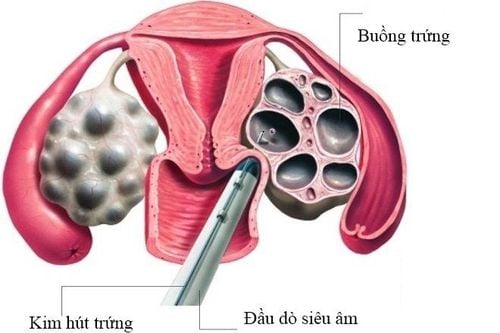
The procedure typically lasts about 15 minutes and is performed in an operating room, with patients being observed for a few hours before being discharged the same day. Despite this, the procedure requires anesthesia and carries certain inherent risks. The potential complications of egg retrieval are detailed as follows:
2. Potential Complications After Egg Retrieval
Most complications from egg retrieval stem from the path of the needle as it passes through the vaginal wall into the ovary, potentially damaging nearby sensitive tissues and organs, such as the internal iliac artery adjacent to the ovary or the ureter located nearby.
One potential complication is abdominal bleeding caused by accidental puncture of a major artery during the procedure. The walls of the arteries in the pelvic region can tear further with each heartbeat, exacerbating the bleeding. Blood may spread into the abdominal cavity or flow out through the vagina. In some cases, emergency surgery may be required to stop the bleeding and clean the abdominal cavity. However, due to the guidance of ultrasound, the likelihood of such complications remains very low. Abdominal bleeding immediately after egg retrieval may also result from injury to blood vessels on or within the ovary during the procedure. While this type of bleeding is less severe than damage to pelvic arteries, it occurs more frequently.

Other potential complications include bowel injury, peritonitis, ureteral damage leading to stricture, and pelvic abscess formation.
Another complication reported after egg retrieval is ovarian torsion, which occurs when the ovary twists around its own axis, cutting off its blood supply. In a study involving 1,500 women, ovarian torsion occurred in 0.13% of cycles. Unfortunately, ovarian torsion often happens later, typically 6 to 13 weeks after egg retrieval. This complication is more common in pregnancies achieved through IVF due to the enlarged ovaries following ovarian stimulation, which makes them more prone to twisting.
To minimize these complications, the procedure must be performed with the highest level of precision, particularly in high-risk individuals, such as those with a history of pelvic or abdominal surgery, pelvic inflammatory disease, or ovarian endometriosis.
3. Complications Related to Anesthesia/Sedation
In addition to the procedural risks, women undergoing egg retrieval may also face potential risks associated with anesthesia used to manage pain during the procedure.
The pain from egg retrieval is primarily caused by the needle being pushed through the vaginal wall and into the ovary. Since the pain signals travel to the spinal cord before reaching the brain, spinal anesthesia commonly used during childbirth can be considered. These are spinal injections that block nerve transmission at the cervix to alleviate pain. If spinal anesthesia is not suitable, intravenous sedation may be required for general anesthesia. In this case, patients may face risks similar to those in standard surgical procedures, including allergic reactions to anesthetics, hypotension, or prolonged respiratory depression. However, most patients undergoing egg retrieval today receive intravenous sedation due to its simplicity and minimal risk of complications.
4. Long-Term Complications Affecting Reproductive Function
There are two main reasons to explain potential risks following egg retrieval that could impact future fertility. The first reason stems from complications such as infections and bleeding, as described earlier. In some cases, surgical intervention is required to address these complications, and such surgeries could have long-term effects on fertility.
The second reason involves damage to reproductive organs caused by the needle passing through surfaces, traveling from the vaginal wall to the ovaries. Some theories suggest that these injuries may lead to the formation of antibodies against ovarian tissue. In fact, research has found that women who undergo egg retrieval tend to have a higher presence of ovarian antibodies compared to those who have not undergone this procedure.
Moreover, ovarian antibodies have been shown to correlate with failure in in vitro fertilization (IVF) procedures. These antibodies can interfere with the binding of sperm to the egg, thereby making fertilization more challenging. Fortunately, this complication is extremely rare.

In conclusion, the egg retrieval procedure, which involves using a needle to extract eggs from ovarian follicles by passing through the vaginal wall into the ovaries under anesthesia, carries certain unavoidable risks. However, statistical data indicate that the risk of complications is relatively low. Therefore, selecting a reputable and highly specialized fertility support center is an essential first step in minimizing potential complications, paving the way for the dream of parenthood.
Msc. MD. Nguyễn Ngọc Chiến has been trained and certified by many prestigious medical universities both domestically and internationally. With extensive experience in the field of obstetrics and gynecology, Dr. Chiến is currently working at the Fertility Support Center of Vinmec Times City International Hospital.
Please dial HOTLINE for more information or register for an appointment HERE. Download MyVinmec app to make appointments faster and to manage your bookings easily.






